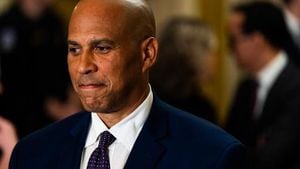A U.S. federal judge has recently rejected Boeing's plea deal related to the well-documented crashes of the 737 MAX, leaving many families of the victims feeling hopeful for greater accountability. The plea deal, put forward by the Justice Department, allowed Boeing to plead guilty to felony conspiracy and would have imposed significant financial penalties on the company. The proposal also stipulated the appointment of an independent monitor to oversee Boeing's operations during its probationary period.
U.S. District Judge Reed O'Connor cast doubt on the appropriateness of this deal, largely due to its provisions related to diversity and inclusion. He expressed reservations about the stipulation requiring the hiring of the monitor to adhere to certain diversity standards. O'Connor criticized the agreement for sidelining the court's authority to select and monitor the safety oversight processes which, he argued, could undermine public trust.
The original deal from July 2024 would have seen Boeing paying up to $487 million, with this amount split between fines and compensatory payments related to the fallout from two fatal crashes, one occurring in October 2018 and another in March 2019, which claimed 346 lives. The arrangement included directives for Boeing to invest heavily—up to $455 million—in compliance and safety improvements.
Although the deal aimed to pacify federal scrutiny and mollify some critics, many families expressed their dissatisfaction with the terms, characterizing them as being too lenient. They argued even the substantial monetary penalties didn’t adequately reflect the pain endured or the risk posed by the manufacturer. Legal representatives for these families, who have called for tougher sanctions against Boeing, expressed gratitude for the judge's tough stance.
"Judge O’Connor has recognized this deal as cozy between the government and Boeing, failing to truly hold Boeing accountable for its past transgressions," argued Paul Cassell, attorney for several of the families. He firmly believes the ruling should prompt serious renegotiations of the agreement. According to them, tougher measures are necessary to prevent future tragedies akin to those associated with the 737 MAX.
One point of contention for O'Connor's ruling centered on Boeing's commitment to transparency and ethics, particularly as it pertains to the hiring process for the independent monitor. The judge contended the vague terms surrounding the diversity and inclusion aspects lacked clarity and could introduce biases detrimental to safety oversight. The judge’s assertion speaks volumes about the broader implications of corporate ethics post-crisis.
The families are adamant about the need for continued vigilance against corporate negligence, as past safety lapses have raised serious questions about Boeing's oversight of its own practices. The court's harsh assessment aims to recalibrate such laxities. They demand unprecedented accountability from Boeing, advocating for thorough investigations not just of the crashes themselves but also about the company's structural decisions leading to them.
The cry for justice underlined the multi-dimensional impacts of Boeing's errors. The 737 MAX's software deficiencies and the company's reluctance to fully disclose them, ascertainably backfired and contributed directly to the tragic circumstances. Many of the victims' families and their legal counsel believe the crashes are emblematic of systemic failures within Boeing's corporate ethos.
Since these crashes, Boeing has quadrupled down on its commitment to safety and transparency, yet this ruling challenges the efficacy of those promises heavily. The judge's decision does not just affect Boeing's current operations but also reflects the sentiment of vigilance from communities assessing corporate responsibility and ethical operations.
Now, both sides have been granted 30 days to negotiate and propose how they wish to navigate forward, whether by drafting another plea agreement or proceeding to trial. The outcome remains uncertain, yet the atmosphere reflects increased scrutiny and heightened expectations: public opinion demands Boeing confront its past failures more openly and honestly. The public sentiment exemplifies how the families and the broader society expect significant interaction with more than superficial remediation.
Consequently, the repercussions of this judicial decision spiral well beyond Boeing, steering discussions on aviation safety regulatory practices as well. Industry stakeholders, from regulators to other manufacturers, are left contemplating whether the existing frameworks and guidelines adequately shield the public from corporate malfeasance or if they require comprehensive overhauls.
While Boeing continues to face quandaries born from the past, the conversation transcends merely corporate responsibility. It probes deep-rooted ethical questions about the intersection between profit and human life. This case against Boeing no longer solely serves as litigation; it evolves as part of broader dialogues on safety, trust, and ethical governance within corporate America.
For the families and advocates pushing for accountability, the next steps could bear monumental significance—either symbolizing true reconciliation and justice or leading to more systemic failures cloaked under corporate bipartisanship. The pressure is palpable, and as the clock ticks down on the thirty-day deadline, all eyes remain fixed on Boeing's next moves—and what they may herald for the future of aviation safety and corporate ethics.



